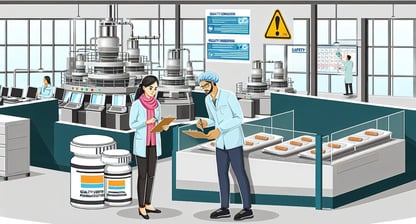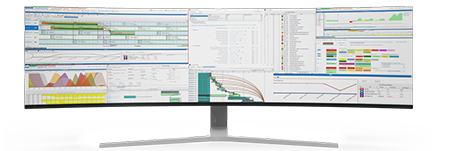Proactive Quality Control
In pharmaceutical manufacturing, staying ahead of the game is not just about producing drugs efficiently; it's also about ensuring top-notch quality control throughout the production process. Production schedulers play a pivotal role in achieving this delicate balance between efficiency and quality.
In this blog, we will look into the concept of proactive quality control in scheduling and explore how integrating scheduling software like PlanetTogether with ERP, SCM, and MES systems can revolutionize pharmaceutical manufacturing operations.
The Role of a Production Scheduler in Pharmaceutical Manufacturing
Before we look into the nitty-gritty of proactive quality control and integration, let's first understand the significance of a production scheduler in a pharmaceutical manufacturing facility.
A production scheduler is essentially the conductor of the manufacturing orchestra. They are responsible for creating and managing production schedules that optimize the utilization of resources, meet customer demand, and ensure timely delivery of pharmaceutical products. The scheduler must also consider factors like equipment availability, labor constraints, and regulatory compliance.

Quality Control in Pharmaceutical Manufacturing
Quality control in pharmaceutical manufacturing is non-negotiable. The consequences of producing subpar drugs can be catastrophic, not just in terms of health and safety but also in terms of regulatory fines and damage to the brand's reputation. This is where proactive quality control comes into play.
Proactive quality control involves anticipating potential quality issues before they occur rather than simply reacting to problems as they arise. It's about identifying and mitigating risks in advance to ensure that every batch of pharmaceutical products meets the highest quality standards.
The Challenges of Proactive Quality Control
Proactive quality control presents several challenges in pharmaceutical manufacturing:
Complex Regulatory Landscape: Pharmaceutical companies must adhere to a myriad of regulations and standards, such as Good Manufacturing Practices (GMP), which vary by region. Compliance with these regulations is a must, and any deviation can result in severe consequences.
Batch Variability: Pharmaceutical production often involves complex chemical processes, leading to batch-to-batch variability. Schedulers must factor in this variability when creating schedules to maintain consistent quality.
Resource Optimization: Balancing resource utilization and quality can be tricky. Overloading equipment or workers can lead to errors and quality issues, while underutilization can increase costs.
Supply Chain Complexity: The pharmaceutical supply chain is global and intricate. Schedulers must coordinate with suppliers, manage inventory, and account for lead times, all while maintaining quality standards.
![]()

The Power of Integration
This is where integration between scheduling software like PlanetTogether and enterprise systems like ERP, SCM, and MES can be a game-changer. Let's explore how this integration can address the challenges of proactive quality control:
Real-time Data Exchange
Integrating PlanetTogether with ERP (Enterprise Resource Planning) systems allows for real-time data exchange. This means that schedulers have access to up-to-the-minute information on inventory levels, demand forecasts, and production capacities. This real-time visibility enables them to make more informed decisions and adjust schedules on the fly to maintain quality standards.
Quality-Centric Scheduling
With integrated SCM (Supply Chain Management) systems, production schedules can be optimized not just for efficiency but also for quality. Schedulers can factor in supplier performance, lead times, and quality control checks at various stages of the supply chain. This ensures that raw materials and components meet quality standards before they even enter the production process.
MES for Shop Floor Control
Manufacturing Execution Systems (MES) play a crucial role in maintaining quality on the shop floor. Integration between PlanetTogether and MES systems allows for real-time monitoring of production processes. Any deviations from quality standards can trigger immediate corrective actions, preventing the production of subpar products.
Regulatory Compliance
Pharmaceutical companies deal with stringent regulatory requirements. Integration with ERP systems that have compliance modules ensures that scheduling decisions align with regulatory standards. This reduces the risk of non-compliance and associated penalties.
Predictive Analytics
Integration with advanced analytics tools, such as those offered by SAP, Oracle, Microsoft, Kinaxis, and Aveva, can provide schedulers with predictive insights. These insights can help in identifying potential quality issues well in advance, allowing for proactive measures to be taken.
In the world of pharmaceutical manufacturing, proactive quality control is not just a desirable goal; it's a necessity. Production schedulers play a pivotal role in achieving this goal, and the integration of scheduling software like PlanetTogether with ERP, SCM, and MES systems can make their job significantly more effective.
By having access to real-time data, quality-centric scheduling capabilities, and the ability to monitor and respond to deviations in real time, pharmaceutical companies can ensure that every batch of their products meets the highest quality standards. This not only safeguards patient health but also protects the brand's reputation and bottom line.
In an industry where quality is essential, proactive quality control through integration is the key to success. It's time for pharmaceutical manufacturers to embrace this paradigm shift and unlock the full potential of their production scheduling operations.
Are you ready to take your manufacturing operations to the next level? Contact us today to learn more about how PlanetTogether and integrated scheduling solutions can help you achieve your sustainability goals and drive success in the pharmaceutical industry.
Topics: Regulatory Compliance, PlanetTogether Software, Integrating PlanetTogether, Real-Time Data Exchange, Enhanced Shop Floor Control, Enhances Predictive Analytics, Quality-Centric Scheduling, Pharmaceutical Manufacturing




















LEAVE A COMMENT